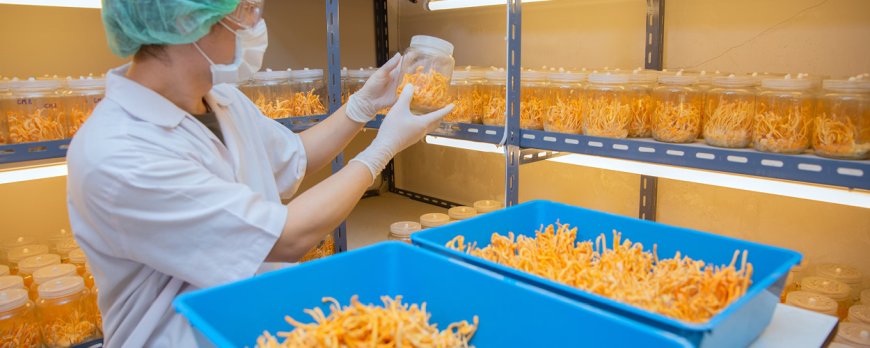Do cordyceps lower blood sugar?
Explore the potential benefits of cordyceps. Do cordyceps lower blood sugar? Uncover scientific findings, expert opinions, and more in our comprehensive guide.

Do Cordyceps Lower Blood Sugar?
Cordyceps, a type of mushroom used in traditional Chinese medicine, has been associated with potential blood sugar-lowering effects. Research suggests that cordyceps can stabilize glucose metabolism and lower blood sugar levels, making it potentially beneficial for diabetes treatment and prevention. Animal studies have shown that cordyceps extracts can regulate blood sugar levels, protect internal organs against diabetes-related damage, and prevent diabetic nephropathy. However, more human studies are needed to fully understand the effects of cordyceps on diabetes. Nonetheless, cordyceps mushrooms are generally safe to consume and can be a complementary and alternative medicine option for diabetes management.
Key Takeaways:
- Cordyceps mushrooms have been used in traditional Chinese medicine for centuries.
- Research suggests that cordyceps can stabilize glucose metabolism and lower blood sugar levels.
- Animal studies have shown that cordyceps extracts can regulate blood sugar levels and protect organs against diabetes-related damage.
- More human studies are needed to fully understand the effects of cordyceps on diabetes management.
- Cordyceps mushrooms are generally safe to consume as a complementary approach to diabetes management.

Understanding Cordyceps and its Benefits
Cordyceps mushrooms, specifically Cordyceps militaris and Cordyceps sinensis, have a long history of use in traditional Chinese medicine and are known for their various health benefits. These mushrooms, often referred to as "caterpillar fungus," are actually a parasitic fungus that grows on the larvae of certain insects.
Traditional uses of cordyceps include improving respiratory function, boosting energy levels, and enhancing athletic performance. However, recent research has also explored the potential benefits of cordyceps in managing blood sugar levels.
Here are some key points to understand about cordyceps and its benefits:
- Cordyceps mushrooms contain bioactive compounds that have antioxidant, anti-inflammatory, and immunomodulating properties.
- Research suggests that cordyceps may help stabilize glucose metabolism and promote better blood sugar control.
- Animal studies have shown that cordyceps extracts can regulate blood sugar levels and protect internal organs from diabetes-related damage.
- However, it is important to note that more human studies are needed to fully understand the effects of cordyceps on diabetes and its management.
In conclusion, cordyceps mushrooms have a long history of use in traditional medicine and are known for their various health benefits. While research indicates that cordyceps may play a role in blood sugar management, more studies are needed to confirm these findings. Nonetheless, cordyceps mushrooms are generally safe to consume and can be considered as a complementary and alternative medicine option for individuals looking to manage their blood sugar levels.
The Relationship Between Cordyceps and Blood Sugar Levels
Research suggests that cordyceps mushrooms, specifically Cordyceps militaris and Cordyceps sinensis, may play a role in stabilizing glucose metabolism and regulating blood sugar levels. These medicinal mushrooms have been used in traditional Chinese medicine for centuries and are known for their many health benefits. While more human studies are needed to fully understand the effects of cordyceps on diabetes, animal studies have shown promising results.
Animal studies have demonstrated that cordyceps extracts can effectively regulate blood sugar levels. They have been found to enhance insulin sensitivity and improve glucose utilization in several studies. These effects could potentially benefit individuals with diabetes by helping to maintain healthy blood sugar levels and preventing spikes.
Furthermore, cordyceps mushrooms have shown protective effects against diabetes-related damage. Studies have found that cordyceps extracts can help protect internal organs, such as the kidneys, liver, and pancreas, from the harmful effects of diabetes. Additionally, cordyceps has been shown to prevent the development of diabetic nephropathy, a common complication of diabetes that affects the kidneys.
While cordyceps mushrooms have shown promising effects in animal studies, it is important to note that further research is needed to determine their full potential in human diabetes management. Additionally, it is important to consult with a healthcare professional before incorporating cordyceps into your diabetes management plan. Nonetheless, cordyceps mushrooms are generally safe to consume and can be a complementary and alternative medicine option for individuals looking to regulate their blood sugar levels.
Cordyceps as a Potential Treatment for Diabetes
Cordyceps has shown promise as a potential treatment option for individuals with diabetes, based on preliminary research findings. These medicinal mushrooms, specifically Cordyceps militaris and Cordyceps sinensis, have a long history in traditional Chinese medicine and are known for their various health benefits. When it comes to blood sugar regulation, cordyceps has been found to stabilize glucose metabolism and lower blood sugar levels, which could be beneficial for diabetes management.
Animal studies have further supported the potential of cordyceps as a complementary treatment for diabetes. Extracts derived from cordyceps have been shown to regulate blood sugar levels, protecting internal organs from diabetes-related damage. In particular, studies have shown that cordyceps can help prevent diabetic nephropathy, a condition characterized by kidney damage that often accompanies diabetes.
Although the preliminary findings are promising, it is important to note that more human studies are needed to fully understand the effects of cordyceps on diabetes. While cordyceps mushrooms are generally considered safe to consume, it is vital for individuals with diabetes to consult with a healthcare professional before incorporating cordyceps into their diabetes management regimen. This ensures that any potential interactions with medications or individual health considerations are taken into account.
In conclusion, cordyceps mushrooms hold potential as a complementary and alternative medicine option for individuals with diabetes. Their ability to regulate blood sugar levels and protect against diabetes-related damage in animal studies suggests that cordyceps may have a role to play in diabetes management. However, further research, particularly in human studies, is necessary to fully understand the benefits and limitations of cordyceps as a treatment for diabetes.

Animal Studies on Cordyceps and Blood Sugar Control
Animal studies have provided insights into the potential blood sugar-regulating properties of cordyceps extracts. These studies have shown that cordyceps mushrooms, particularly Cordyceps militaris and Cordyceps sinensis, can help stabilize glucose metabolism and lower blood sugar levels.
In one study, diabetic mice were given cordyceps extracts, and it was found that their blood sugar levels decreased significantly compared to the control group. The extracts were also found to improve insulin sensitivity, which plays a crucial role in blood sugar regulation.
Furthermore, research has shown that cordyceps extracts can protect internal organs, such as the liver and kidneys, from diabetes-related damage. Diabetic mice treated with cordyceps extracts exhibited reduced inflammation and oxidative stress in these organs, indicating a potential protective effect against diabetes complications.
Additional studies have also demonstrated that cordyceps extracts can prevent diabetic nephropathy, a common kidney complication of diabetes. In animal models of diabetes, cordyceps supplementation was found to improve kidney function, reduce kidney damage, and regulate blood sugar levels.
While these animal studies highlight the potential benefits of cordyceps in blood sugar control and diabetes management, it is important to note that further research is needed to validate these findings in human subjects. Nonetheless, cordyceps mushrooms are generally considered safe and can be a complementary and alternative medicine option for individuals looking to manage their blood sugar levels.
Please consult a healthcare professional before making any changes to your diabetes treatment plan or incorporating cordyceps supplements.
Cordyceps and Protection Against Diabetes-Related Damage
Research suggests that cordyceps may have protective effects against diabetes-related damage to internal organs. These potent mushrooms, including Cordyceps militaris and Cordyceps sinensis, have been used for centuries in traditional Chinese medicine and are known for their numerous health benefits.
Animal studies have demonstrated that cordyceps extracts can help regulate blood sugar levels, which is crucial for managing and preventing diabetes. Additionally, these studies have shown that cordyceps may safeguard internal organs from the damaging effects of diabetes. This is particularly important as diabetes can lead to complications such as kidney damage (diabetic nephropathy) and impaired organ function.
Key Benefits of Cordyceps for Diabetes:
- Stabilizes glucose metabolism
- Regulates blood sugar levels
- Protects internal organs from diabetes-related damage
- Prevents diabetic nephropathy
While these animal studies are promising, further research involving human subjects is needed to fully understand the effects of cordyceps on diabetes and its potential as a complementary approach to diabetes management. Additionally, it's important to note that cordyceps mushrooms are generally safe to consume and can be considered as a natural alternative for individuals looking for additional support in managing their diabetes.
Cordyceps Supplements and Diabetes Management
Cordyceps supplements are available in various forms and may provide a natural approach to blood sugar control for individuals with diabetes. These supplements are typically derived from Cordyceps militaris or Cordyceps sinensis mushrooms, which have been traditionally used in Chinese medicine for their potential health benefits. As complementary and alternative medicine options, cordyceps supplements have gained popularity due to their potential to regulate blood sugar levels and improve diabetes management.
When choosing cordyceps supplements, it is important to consider factors such as the product's quality, dosage, and form. Here are a few considerations to keep in mind:
- Quality: Look for supplements that are made from high-quality cordyceps mushrooms and have undergone rigorous testing for purity and potency. Third-party certifications can also help ensure the quality of the product.
- Dosage: The appropriate dosage of cordyceps supplements may vary depending on factors such as age, overall health, and specific health conditions. It is advisable to consult a healthcare professional to determine the right dosage for you.
- Form: Cordyceps supplements are available in various forms including capsules, powders, extracts, and teas. Choose the form that suits your preference and lifestyle.
While cordyceps supplements can be a promising addition to diabetes management, it is essential to note that they should not replace prescribed medications or lifestyle modifications recommended by healthcare professionals. Always consult with your healthcare provider before incorporating any new supplements into your routine, especially if you have existing medical conditions or are taking other medications.

The Need for Human Studies
While promising, more human studies are needed to solidify the effects of cordyceps on blood sugar regulation in individuals with diabetes. Although animal studies have demonstrated the potential benefits of cordyceps in managing blood sugar levels, it is crucial to conduct clinical trials involving human subjects to validate these findings.
Human studies are essential for several reasons. Firstly, they allow researchers to evaluate how cordyceps specifically affects blood sugar regulation in individuals with diabetes, taking into account factors such as age, gender, and comorbidities. Secondly, human studies provide insight into the optimal dosage and duration of cordyceps supplementation for maximum efficacy. These studies can also help identify any potential side effects or interactions with other medications that individuals with diabetes may be taking.
In addition, human studies help establish the generalizability of cordyceps' effects on blood sugar regulation. By involving a diverse range of participants, including those from different ethnic backgrounds and with varied health statuses, researchers can assess the broader impact of cordyceps on diabetes management. This knowledge is crucial for healthcare professionals and individuals with diabetes who are considering cordyceps as a complementary approach to their treatment plan.
Therefore, further research in the form of well-designed human studies is warranted to provide a solid foundation for understanding the therapeutic potential of cordyceps in blood sugar regulation. These studies are essential for guiding evidence-based recommendations and ensuring the safe and effective use of cordyceps supplementation as part of a comprehensive diabetes management strategy.

Safety and Considerations
Cordyceps mushrooms are generally safe to consume; however, it is important to be aware of potential side effects and consider any medication interactions. While cordyceps is considered safe for most people, some individuals may experience mild gastrointestinal discomfort, including nausea, diarrhea, or an upset stomach. If you notice any adverse effects after consuming cordyceps, it is recommended to discontinue use and consult a healthcare professional.
It is important to note that cordyceps may interact with certain medications, particularly those that affect blood clotting or suppress the immune system. If you are taking any medications or have underlying health conditions, it is crucial to speak with your healthcare provider before incorporating cordyceps into your routine. They can provide personalized advice based on your specific circumstances and help you make an informed decision.
When choosing cordyceps supplements, it is essential to opt for reputable brands that prioritize quality and safety. Look for products that have been tested for purity and potency by third-party organizations, such as the United States Pharmacopeia (USP) or ConsumerLab. Additionally, follow the recommended dosage instructions provided by the manufacturer, as exceeding the recommended dose may not result in additional benefits and could potentially lead to adverse effects.
In summary, cordyceps mushrooms show promise in blood sugar regulation and may have potential benefits for diabetes management. However, it is crucial to prioritize safety and consider individual circumstances before incorporating cordyceps into your routine. Consult with a healthcare professional to ensure cordyceps is suitable for you and to determine the appropriate dosage for your needs.
Conclusion
Cordyceps mushrooms show promise as a natural option for blood sugar regulation; however, further research is necessary to fully understand their effectiveness in individuals with diabetes. Factual data suggests that cordyceps can stabilize glucose metabolism and lower blood sugar levels, making it potentially beneficial for diabetes treatment and prevention. Animal studies have demonstrated that cordyceps extracts can regulate blood sugar levels, protect internal organs against diabetes-related damage, and prevent diabetic nephropathy.
While these findings are promising, it is important to note that more human studies are needed to validate these results. Scientific research on cordyceps and diabetes management is still limited, and additional investigations are required to determine the optimal dosage, efficacy, and potential side effects. Therefore, it is recommended that individuals consult a healthcare professional before incorporating cordyceps supplements into their diabetes management regimen.
Nevertheless, cordyceps mushrooms are generally considered safe to consume, and they offer a complementary and alternative medicine option for individuals seeking additional support in blood sugar regulation. With their long history of use in traditional Chinese medicine, cordyceps mushrooms have been recognized for their various health benefits. Incorporating cordyceps into a well-rounded approach to diabetes management, which includes a healthy diet, regular exercise, and prescribed medications, may provide added benefits to individuals with diabetes.
In conclusion, while cordyceps mushrooms show promise in blood sugar regulation, more research is needed to fully understand their effects on individuals with diabetes. Nevertheless, cordyceps can be considered a natural option for diabetes management, and its potential benefits warrant further investigation in order to provide evidence-based recommendations for its use.
































































































































